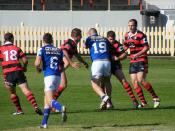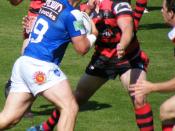The definition of diversity as provided is straight and to the point, "A point or respect in which things differ". When discussing diversity in business and therefore in teams most view diversity as simply demographic, a matter of color, gender, or age. However, "Diversity is also based on informational differences, reflecting a person's education and experience, as well as on values or goals that can influence what one perceives to be the mission of something as small as a single meeting or as large as a whole company" (Neale). Research and experience has shown that diversity can have both positive business effects and negative ones.
"Diversity among employees can create better performance when it comes to out-of-the-ordinary creative tasks such as product development or cracking new markets, and managers have been trying to increase diversity to achieve the benefits of innovation and fresh ideas" (Neale). There is a widespread of team formats, in which can include CQ circles, self-managed teams, virtual teams, and of course cross-functional teams. (Kreitner, 485). On the issue of cross-functional teams researches have determined that "teams of specialists from different functional areas might not be able to exploit their diverse expertise because of cross-functional communication and coordination problems. They theorized that teams of people with a breadth of functional experiences (i.e., intra-personal functional diversity) might be better at overcoming communication barriers while still benefiting from diverse functional experiences." (Sutcliffe).
Neale does not believe that diversity will directly increase performance, as stated she believes that different types of diversity generate various sorts of conflict, which affects how a team performs. "The kind of group conflict that exists and how the team handles the conflict will determine whether this diversity is effective in increasing or reducing performance." (Neale). The researchers found that informational diversity stirred constructive conflict,


